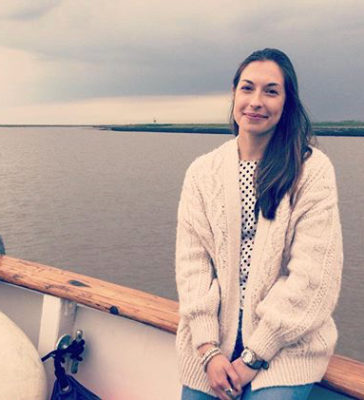
Fiona Birch
Current Employer/Organisation Name
Brown and May Marine Ltd.
What have you been doing since leaving Exeter, and what are you doing now?
After graduating with a BSc in Biological Sciences from the University of Exeter Streatham campus, I went on to study an MSc in Conservation Science and Policy at the Penryn campus in Cornwall. Towards the end of my MSc, I was lucky enough to be offered a short-term Research Assistant role by my dissertation supervisor at the Penryn campus. I was responsible for developing the Myanmar Marine Biodiversity Atlas to illustrate the current state of marine resources in Myanmar through spatial information. The Atlas lays a foundation for future marine spatial planning and conservation activities, by showcasing a large number of maps detailing Myanmar’s physical marine environment, oceanography, marine habitats, biodiversity and fisheries, in addition to important human influences that will play a role in shaping the country’s marine environment. I subsequently secured an internship with Client Earth’s Sustainable Seafood team in London. I was involved in running and managing the Sustainable Seafood Coalition (SSC); a partnership of major UK seafood suppliers and retailers acting to promote responsible and sustainable fish and seafood consumption. I regularly undertook research into the issues facing the fisheries and aquaculture sectors, and wrote newsletters and blogs to inform ClientEarth’s sustainable seafood team, the wider seafood industry and general public. Upon finishing my internship, I landed a job back in my home county of Suffolk with a local fisheries consultancy called Brown and May Marine Ltd. This is my current position and my job title is Marine and Environmental Consultant. I am currently responsible for managing the fisheries liaison and communication activities for a number of offshore wind farm and subsea cable developments throughout the UK. This includes organising and chairing commercial fisheries working group meetings and facilitating consultation between fishermen and offshore developers. The work involves a lot of liaison with fisheries stakeholders and I am frequently required to communicate complex information to fishermen, both in person and over the phone. Furthermore, I also write Environmental Impact Assessment (EIA) reports on fish/shellfish ecology and commercial fisheries, as well as producing charts using geographic information systems (GIS). I have been on a number of surveys at sea, including a two-week herring larval survey in the Moray Firth in Scotland, during which I lived on a shrimp trawler! The job is very varied and often fast-paced and reactive, requiring an aptitude for prioritisation of work and problem solving.
Why did you choose this career? And what do you enjoy most about your work?
I have always loved the sea. I possess a real interest in the marine environment and how marine conservation can be balanced with sustainable development. What I enjoy most about my role is working directly with the fishing industry. I get unique insights into the realities of fishing and the pressures that UK fishermen are facing today.
Please tell us if you were a member of any societies, groups or sports clubs?
– University of Exeter Boat Club (rowing) – XTV – Athena Swan Charter – The Natural Selection Podcast.
What did you enjoy most about your programme and what was the biggest highlight?
I loved the marine biology modules with Professor Steve Simpson and Dr Ceri Lewis. The highlight of my BSc has to be the Bahamas marine ecology field course.
What did you enjoy most about studying here?
The beautiful campus and the charm of the city of Exeter.
Why did you choose to study at Exeter?
What attracted me to study at Exeter was the vast array of modules on offer, from Forensic Science to Marine Biology to the amazing field courses. I also loved the feel of the University campus and its strong reputation for sport. Coming from the countryside, I didn’t want to go to a big, big city University, and Exeter felt like the perfect combination of town and country.
What skills and experiences have been most useful for your career?
Writing essays and dissertations has proved invaluable in helping me develop my articulate writing style. This has been hugely beneficial for writing reports in my current role. The GIS skills I developed during my studies have been useful in my career. My GIS capabilities got me my first job as a Research Assistant and I still use GIS to make maps and charts on a daily basis in my current job. Giving presentations to an audience during my studies has been very beneficial because it has prepared me well for public speaking.
What advice would you give to a current student who wishes to pursue your career?
My advice would be to try and secure an internship or some voluntary work on a fishing vessel, patrol vessel, or research vessel. This will demonstrate to employers that you have gained some relevant experience. It will also really enhance your understanding of the fishing industry. Try contacting your local Inshore Fisheries and Conservation Authority if this interests you.
What are your plans for the future?
To continue to pursue a career in marine conservation and sustainable fisheries.

